
Author Robert Whitaker
Journalist and author Robert Whitaker has been a controversial figure in mental health circles since 2001 when he published his first book, Mad In America: Bad Science, Bad Medicine, and The Enduring Mistreatment of the Mentally Ill. In 2010, Whitaker’s book, Anatomy of An Epidemic: Magic Bullets, Psychiatric Drugs, and the Astonishing Rise of Mental Illness in America predictably sparked outrage and condemnation in many circles while it was loudly endorsed and applauded in others. An article by Whitaker in the non-peer-reviewed journal Medical Hypotheses, titled The case against antipsychotic drugs: a 50-year record of doing more harm than good should explain to those unfamiliar with his work why he has become such a lightening rod.
In April, Whitaker released a new book entitled: Psychiatry Under The Influence: Institutional Corruption, Social Injury, and Prescriptions for Reform, which he co-authored with Lisa Cosgrove, a fellow critic of the pharmaceutical industry and a professor at the University of Massachusetts in Boston. This book is aimed at more of an academic crowd than a mass audience.
Knowing how controversial Whitaker’s work is, I asked Virgil Stucker, executive director of CooperRiis Healing Community to write a review, which he was kind enough to send me.
Book Review: Psychiatry Under The Influence: Institutional Corruption, Social Injury, and Prescriptions for Reform
By Virgil Stucker
CooperRiis Healing Community
Bob Whitaker and Lisa Cosgrove’s 207 page book Psychiatry Under the Influence is packed full of provocative and thoughtful comments accompanied by detailed analyses of pharmaceutical research, clinical practice, organizational psychology and social philosophy. It reveals very troubling behaviors that have resulted from the confluence of the practice and promise of psychiatry with the profit seeking of pharmaceutical companies. Thought leaders in psychiatry, who have no financial ties to these companies, need to respond to its findings. It is also a book that should be read by everyone who seeks to help some of society’s most psychically vulnerable as well as by those who seek to help restore grit and resilience into daily life.
Thankfully, it is a book that also helps us to begin bridging the divide between the “It’s All-About-the-Medication” versus the “No-Medication” groups, also known as the Psychiatrists versus the Anti-Psychiatrists. These divided groups are much like the Fundamentalists versus the Atheists. Too often, these divides cause people to lose their heads, to stop listening and to react mindlessly. From my perspective this book is not fuel for the fire but is instead an honest and open expression of Whitaker and Cosgrove’s best efforts to show us compelling evidence of undue influence on psychiatry by pharmaceutical interests while suggesting a unifying path forward.





